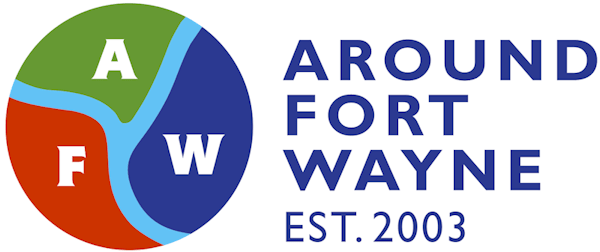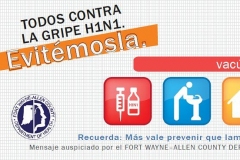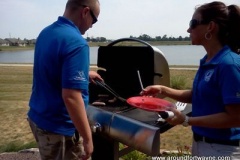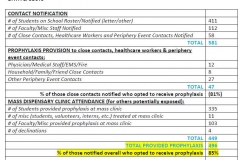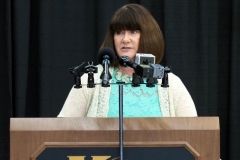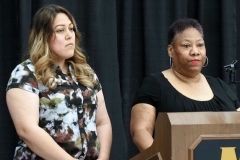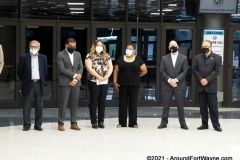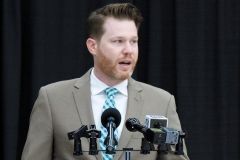![]()
News release from the
Staying safe when the power is out
(July 2, 2012) – With many people still without power and no relief from the heat in sight, the Fort Wayne-Allen County Department of Health and Aging and In-Home Services of Northeast Indiana are encouraging residents to work together to ensure all members of the community are safe.
General Safety
During power outages, it is important that people to do the following to stay safe:
[list type=”black”]
[li]To prevent carbon monoxide poisoning, use generators, pressure washers, grills, and similar items outdoors only.[/li]
[li]Check with local authorities to be sure your water is safe.[/li]
[li]In hot weather, stay cool and drink plenty of fluids to prevent heat-related illness.[/li]
[li]Avoid power lines and use electric tools and appliances safely to prevent electrical shock.[/li]
[/list]
Food Safety
While the power is out, keep the refrigerator and freezer doors closed as much as possible to keep food cold for longer.
If the power is out for longer than 2 hours, follow the guidelines below:
[list type=”black”]
[li]For the Freezer section: A freezer that is half full will hold food safely for up to 24 hours. A full freezer will hold food safely for 48 hours. Do not open the freezer door if you can avoid it.[/li]
[li]For the Refrigerated section: Pack milk, other dairy products, meat, fish, eggs, gravy, and spoilable leftovers into a cooler surrounded by ice. Inexpensive Styrofoam coolers are fine for this purpose.[/li]
[li]Use a food thermometer to check the temperature of your food right before you cook or eat it. Throw away any food that has a temperature of more than 41°F.[/li]
[/list]
Heat Safety
Be aware of your risk for heat stroke, heat exhaustion, heat cramps and fainting. To avoid heat stress, you should:
[list type=”black”]
[li]Drink a glass of fluid every 15 to 20 minutes and at least one gallon each day.[/li]
[li]Avoid alcohol and caffeine which dehydrate the body.[/li]
[li]Wear light-colored, loose-fitting clothing.[/li]
[li]Take frequent cool showers or baths.[/li]
[li]If you feel dizzy, weak, or overheated, go to a cool place. Sit or lie down, drink water, and wash your face with cool water. If you do not feel better, get medical help immediately.[/li]
[li]Work during cooler hours of the day when possible or distribute the workload evenly throughout the day.[/li]
[/list]Heat stroke is the most serious heat illness. It happens when the body cannot control its own temperature and its temperature rises rapidly. Sweating fails and the body cannot cool down. Body temperature may rise to 106°F or higher within 10 to 15 minutes. Heat stroke can cause death or permanent disability if emergency care is not given.
Warning signs of heat stroke vary but can include:
[list type=”black”]
[li]Red, hot, and dry skin (no sweating)[/li]
[li]Rapid, strong pulse[/li]
[li]Throbbing headache[/li]
[li]Dizziness, nausea, confusion, or unconsciousness[/li]
[li]An extremely high body temperature (above 103°F)[/li]
[/list]If you suspect someone has heat stroke, follow these instructions:
[list type=”black”]
[li]Immediately call for medical attention.[/li]
[li]Get the person to a cooler area.[/li]
[li]Cool the person rapidly by immersing him/her cool water or a cool shower, or spraying or sponging him/her with cool water. If the humidity is low, wrap the person in a cool, wet sheet and fan him/her vigorously.[/li]
[li]Monitor body temperature and continue cooling efforts until the body temperature drops to 101-102°F.[/li]
[li]Do not give the person alcohol to drink.[/li]
[li]If emergency medical personnel do not arrive quickly, call the hospital emergency room for further instructions.[/li]
[/list]Likewise, it is important to check on older members of the community who may not have access to cell phones or other means to request assistance.
[list type=”black”]
[li]Adult children should check on parents at least once a day.[/li]
[li]Churches and neighborhood associations should form teams to contact vulnerable members of their congregation or neighborhood daily during the power outage and frequently during times of extreme heat.[/list]At-Risk Individuals
Aging & In-Home Services of Northeast Indiana (AIHS) invites older adults, persons with disabilities or their caregivers in need of assistance to call the Aging & Disability Resource Center (ADRC) direct line at 260-469-3036 or United Way of Allen County’s 2-1-1 call center.
Concerned community members may also call to report individuals potentially at-risk. AIHS has extended ADRC hours of operation on Monday, July 2, and Tuesday, July 3, until 7p.m.to coincide with the City of Fort Wayne cooling centers.
As the Area III Agency on Aging, AIHS is the primary resource for aging and disabled populations in the nine counties of Northeast Indiana: Adams, Allen, DeKalb, Huntington, LaGrange, Noble, Steuben, Wells and Whitley.
For more information about AIHS, visit www.agingihs.org.
The City of Fort Wayne has opened three city cooling centers to provide relief to residents who may be without power or air-conditioning. The locations are:
[list type=”black”]
[li]The Community Center, 233 West Main St., 9 a.m. to 7 p.m.[/li]
[li]Jerry Fox Lifetime Sports Academy at the McMillen Park Golf Clubhouse, 9 a.m. to 7 p.m.[/li]
[li]Jennings Center, 1330 McCulloch St., 9 a.m. to 7 p.m.[/li]
[li]Public Safety Academy, 7602 Patriot Crossing, 9 a.m. to 9 p.m.[/li]
[/list]Residents who cannot stay in their home due to storm damage or an extended power outage can also go to the American Red Cross Shelter at First Assembly of God Church, 1400 W. Washington Center Road., near Lima Road. Residents should enter door number 5.
Residents planning to stay overnight are encouraged to bring their own pillows, linens, towels and personal hygiene items.
